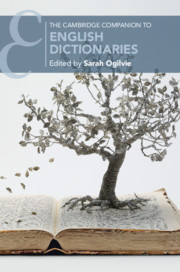Book contents
- The Cambridge Companion to English Dictionaries
- The Cambridge Companion to English Dictionaries
- Copyright page
- Dedication
- Contents
- Illustrations
- Tables
- Notes on Contributors
- Acknowledgements
- Chronology
- Chapter 1 Introduction
- Part I Issues in English Lexicography
- Part II English Dictionaries Throughout the Centuries
- Part III Dictionaries of English and Related Varieties
- Chapter 20 Dictionaries of Canadian English
- Chapter 21 Australian Lexicography: Defining the Nation
- Chapter 22 New Zealand’s Lexicographic Legacy
- Chapter 23 Hobson-Jobson and Dictionaries of Indian English
- Chapter 24 South African English Dictionaries: From Colonial to Post-Colonial
- Chapter 25 Dictionaries of Caribbean English: Agents of Standardisation
- Chapter 26 Dictionary of American Regional English
- Chapter 27 The Scottish Dictionary Tradition
- Guide to Further Reading
- Index
- Cambridge Companions to Literature
Chapter 21 - Australian Lexicography: Defining the Nation
from Part III - Dictionaries of English and Related Varieties
Published online by Cambridge University Press: 18 September 2020
- The Cambridge Companion to English Dictionaries
- The Cambridge Companion to English Dictionaries
- Copyright page
- Dedication
- Contents
- Illustrations
- Tables
- Notes on Contributors
- Acknowledgements
- Chronology
- Chapter 1 Introduction
- Part I Issues in English Lexicography
- Part II English Dictionaries Throughout the Centuries
- Part III Dictionaries of English and Related Varieties
- Chapter 20 Dictionaries of Canadian English
- Chapter 21 Australian Lexicography: Defining the Nation
- Chapter 22 New Zealand’s Lexicographic Legacy
- Chapter 23 Hobson-Jobson and Dictionaries of Indian English
- Chapter 24 South African English Dictionaries: From Colonial to Post-Colonial
- Chapter 25 Dictionaries of Caribbean English: Agents of Standardisation
- Chapter 26 Dictionary of American Regional English
- Chapter 27 The Scottish Dictionary Tradition
- Guide to Further Reading
- Index
- Cambridge Companions to Literature
Summary
This chapter traces the sequence of smaller and larger dictionaries published in Australia in the nineteenth and twentieth centuries, drawing attention to the particular aspects of Australian language, society, culture, and environment that they document, and their association with the major phases in the evolution of Australian English. The earlier specialised dictionaries were compiled during the exonormative phases of Australian English, when Australians still deferred to British English as their main linguistic authority. In contrast, the comprehensive national dictionary (Macquarie Dictionary, 1981) benchmarks the endonormative phase, and becomes the reference point for Australian English as it achieves its linguistic independence. Meanwhile, the compilation of the Australian National Dictionary on Historical Principles (1988), through its association with Oxford University Press, has ensured that many Australianisms are registered in the second and third editions of the Oxford English Dictionary and acknowledged as elements of world English. Australian neologisms, especially informal words ending in –ie, have probably contributed to their greater use in northern hemisphere Englishes, and perhaps to the increasing colloquialisation of English worldwide.
Keywords
- Type
- Chapter
- Information
- The Cambridge Companion to English Dictionaries , pp. 265 - 273Publisher: Cambridge University PressPrint publication year: 2020
- 1
- Cited by

